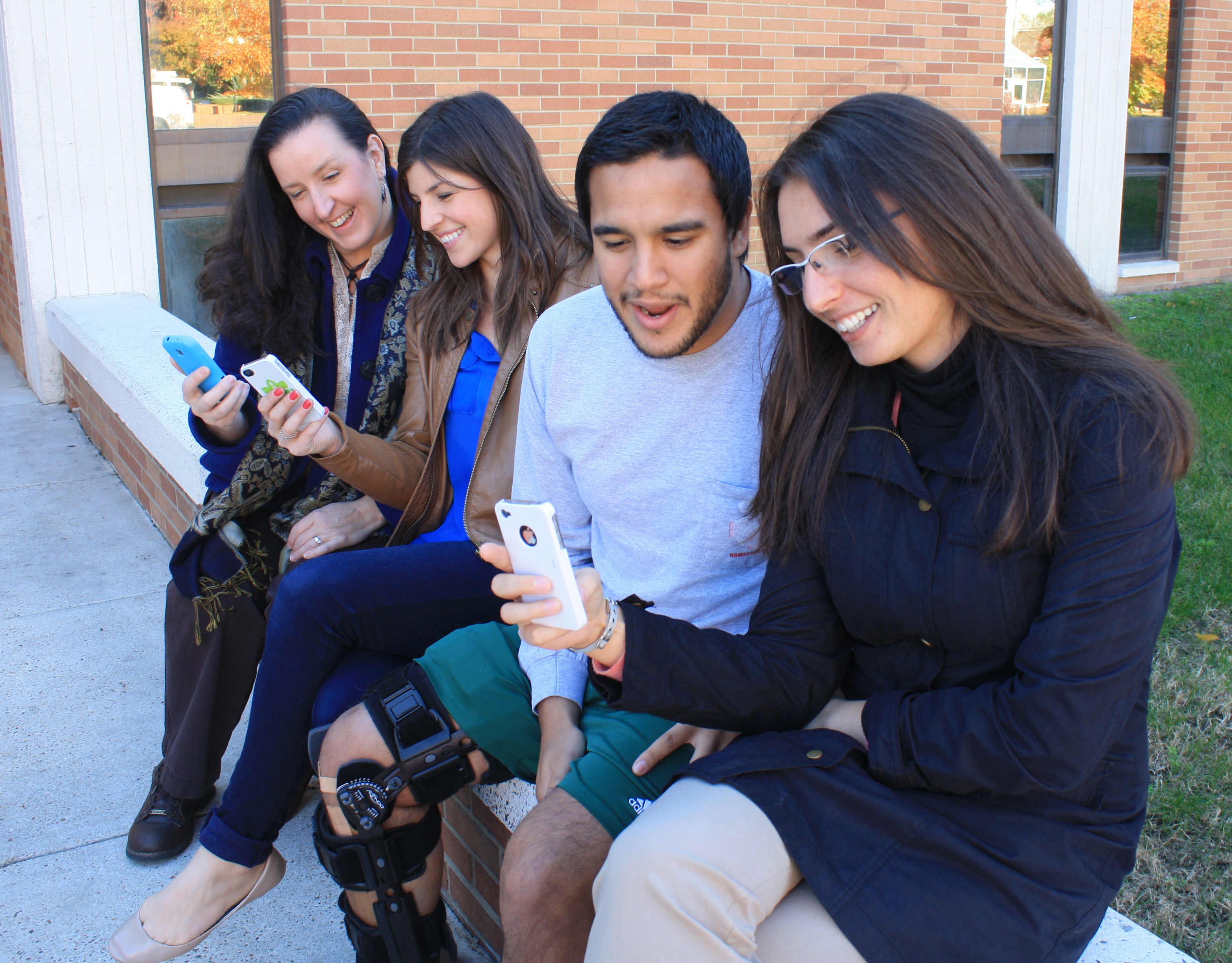Students Investigate Use of Technology to Support Participants in Portsmouth Weight-Loss Initiative
 A class of psychology doctoral students, under the direction of Associate Professor James Paulson, has spent the semester studying ways to make improvements in the Lose It weight loss app being used in a campaign by the city of Portsmouth. Pictured (right to left) are Iva Stoyneva, Adrian Bravo, Brynn Sheehan and Jennifer Brown. Other students who worked on the project are Michele Laaksonen, Amy Stamates and Ashley Linden.
A class of psychology doctoral students, under the direction of Associate Professor James Paulson, has spent the semester studying ways to make improvements in the Lose It weight loss app being used in a campaign by the city of Portsmouth. Pictured (right to left) are Iva Stoyneva, Adrian Bravo, Brynn Sheehan and Jennifer Brown. Other students who worked on the project are Michele Laaksonen, Amy Stamates and Ashley Linden.
By Brendan O'Hallarn
The weight-loss program launched earlier this year by Healthy Portsmouth, a city-sponsored health initiative, hasn't had the impact its proponents were hoping for.
So a class of psychology doctoral students at Old Dominion is investigating how to use Web and mobile technology to better support residents' weight loss attempts by making the program more engaging for participants.
The city of Portsmouth worked with the makers of the "Lose It" app and website to develop an online support system for weight loss. Mayor Kenny Wright (who has battled obesity issues himself) worked with Healthy Portsmouth to challenge residents of the city to lose a combined 500,000 pounds, which would be tracked with help from "Lose It."
More than 400 Portsmouth residents signed up to use the "Lose It" program. However, only a fraction of the participants have become active users of the app, which interested James Paulson, ODU associate professor of psychology.
"Obesity is a huge problem nationwide, and not a problem that's going away," Paulson said. "So the goal of this class was: How do we improve participants' experiences with the 'Lose It' app? How can we better understand participants' experiences with the app in order to make it better?"
Paulson introduced the Health Psychology class at ODU last fall with a specific mission - engage with a community program, collect and analyze data, and offer recommendations for how to improve current operations.
In 2012, Paulson's class took a critical look at the "Healthy You for Life" program run by Children's Hospital of The King's Daughters. At the end of the semester, the class presented a 60-page report to the program facilitators containing numerous suggestions, including a recommendation for an easier way to track and present progress to patients.
"The class created a program that plots a chart of patients' progress on weight loss, which Healthy You for Life is now using," Paulson said.
This year's assignment of the "Lose It" project has been challenging, because little was known about how to best engage Portsmouth residents with the technology. "Healthy Portsmouth launched this initiative quickly and without a lot of time or support for planning ahead," he said. "An ambitious initiative like this that uses technology to drive a health agenda often benefits from a long planning period and lots of funding."
Although there was an incentive for participants at the front end, it's not clear what motivates them to remain engaged.
Throughout the semester, Paulson's seven students have worked in small teams on different aspects of the product analysis - looking at the technology used, the communications strategy and the literature on weight loss interventions nationwide. Their goal for the semester-long project is a comprehensive report to be presented to program administrators, with suggestions on how the make the program run more effectively.
Paulson said the added benefit for his students, many of whom want to work in applied health-related fields, is to learn how difficult things can be when doing "real world" research.
"The biggest part of the lesson for them is learning how messy and frustrating it is, and how many different ways a project may not go as expected," he said.
The students will deliver their findings to Healthy Portsmouth in early December.

